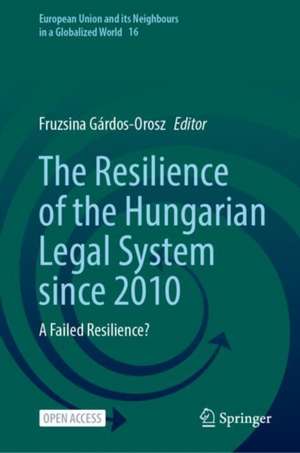The Resilience of the Hungarian Legal System since 2010 : A Failed Resilience? : European Union and its Neighbours in a Globalized World, cartea 16
Editat de Fruzsina Gárdos-Oroszen Limba Engleză Hardback – 27 sep 2024
The volume documents how the Hungarian legal system changed after 2010, on the one hand, and conceptualises these changes with the help of ‘resilience’, on the other hand.
Preț: 425.20 lei
Nou
Puncte Express: 638
Preț estimativ în valută:
81.36€ • 85.12$ • 67.59£
81.36€ • 85.12$ • 67.59£
Carte disponibilă
Livrare economică 13-27 martie
Preluare comenzi: 021 569.72.76
Specificații
ISBN-13: 9783031704505
ISBN-10: 3031704509
Ilustrații: X, 190 p.
Dimensiuni: 155 x 235 mm
Greutate: 0.51 kg
Ediția:2025
Editura: Springer Nature Switzerland
Colecția Springer
Seria European Union and its Neighbours in a Globalized World
Locul publicării:Cham, Switzerland
ISBN-10: 3031704509
Ilustrații: X, 190 p.
Dimensiuni: 155 x 235 mm
Greutate: 0.51 kg
Ediția:2025
Editura: Springer Nature Switzerland
Colecția Springer
Seria European Union and its Neighbours in a Globalized World
Locul publicării:Cham, Switzerland
Cuprins
Introduction - The (non)resilience of the Hungarian Legal System: From Populist Constitutionalism to a Permanent State of Danger. Part I Public Law and Resilience.- Assessing Constitutional Resilience: The Performance of the 2011 Fundamental Law in Fulfilling Constitutional Functions.- ‘Eliminating Conservation’? Re-Regulation of the Hungarian Administrative Procedure in the Act on General Administrative Procedure.- Minority Rights, Minority Protection, and Diaspora Policy in Hungary, 2010–2018.- Changes in the Legal Status of ‘Churches’ in Hungary after 2010.- Part II Criminal Law, Private Law, Regulation and Resilience.- Reflections on the Responsiveness in Hungary of the Legal System – from a Criminal Law Perspective.- Adaptation Mechanisms in Private Law.- Economic and Social Crises, Model Change and the Responsiveness of the Legal System: Special Tax Measures and their Regulation in Hungary.- Risks and Resilience in the European Union’s Regulation of Online Platforms and Artificial Intelligence – Hungary in Digital Europe.- Part III Courts and Resilience.- The Resilience of the Hungarian Court System between 2012 and 2020.- ‘The Past is Unforgettable’: Civil Procedural Law’s Response to the Challenges of Pseudo-Modern Society and Economy in Hungary after 2010.- Part IV Different Theoretical Approaches to Resilience.- Change of Law: Backgrounds and Limits, Expectations and Realizations.- Resilience Thinking – Emergence, Conceptualisations, and Applicability in Social Systems and Law.- A Pluralistic Model of the Responsiveness of Law: The Case of Hungary.
Notă biografică
Fruzsina Gárdos-Orosz is research professor at the Institute for Legal Studies, HUN-REN Centre for Social Sciences and professor of constitutional law at ELTE Law School, Budapest. She has published extensively on different aspects of constitutional law, including the practice of the Hungarian Constitutional Court, the impact of different contemporary challenges to constitutional adjudication, as well as the rule of law resilience of Hungarian legal system. Her latest mongraph is Constitutional Justice under Populism: the Transformation of the Hungarian Constitutional Court since 2010, published at AK-Wolters Kluwer (2024).
Textul de pe ultima copertă
This open access book explains the factors that cause the poor functioning or failure of certain legal institutions or the success of others in the current Hungarian legal system after the 2010 transition from liberal to illiberal/populist democracy. The authors argue in most regulatory areas that reform is needed in lawmaking or in the application and practice of law, because there are systemic problems with the law’s capacity for doctrinal resilience, which lead to the primacy of other regulators than law, such as the populist politics. An understanding of these processes is essential for the implementation of sound law and legal policy reforms, for the maintenance of the legal guarantee system and for the successful development of institutions protecting and providing the fundamental rights.
The volume documents how the Hungarian legal system changed after 2010, on the one hand, and conceptualises these changes with the help of ‘resilience’, on the other hand.
The volume documents how the Hungarian legal system changed after 2010, on the one hand, and conceptualises these changes with the help of ‘resilience’, on the other hand.
Caracteristici
Offers an unique approach in the framework of resilience studies Focuses on one of the greatest contemporary challenges to constitutional democracies, political populism Contributes to the knowledge on the impacts of external and political challenges on law This book is open access, which means that you have free and unlimited access












